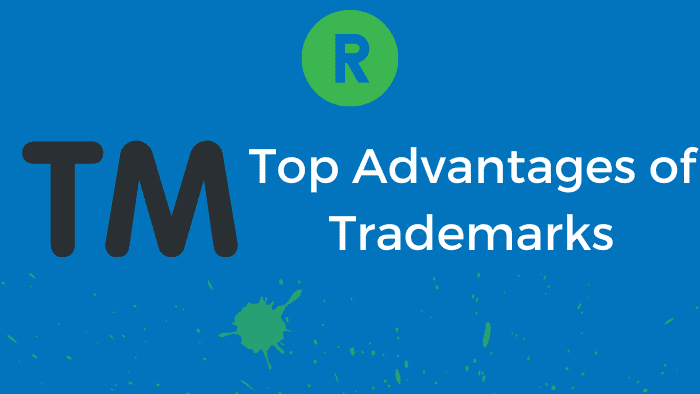When it comes to how customers interact with your brand, trademarks are one of the most important to get right. So what are some benefits of trademarks?
Short, sweet, and to the point, a strong trademark goes a long way to adding value to your brand, as well as letting your customers know what your business is all about.
There are many facets of trademarks and a lot goes into making a strong one. So we hope we can bring some of the more important aspects of your attention.
Before we jump in on the advantages of registering your business trademarks, however, I think it’s important to make sure we’re on the same page.
So now take a sip of coffee, and let’s dive into the world of trademark law…
What Are Trademarks and Why Should I Care?
Trademarks are one of the major 4 areas of intellectual property which are patents, trademarks, copyrights, and trade secrets.
Trademarks have….
- Nothing to do with your actual product or service (that’s patent law)
- Nothing to do with the artwork, photos, or songs you sing (that’s copyright law)
- Nothing to do with the confidential information that helps your business make money (that’s trade secret law)
But they DO have everything to do with protecting the way in which customers perceive your product or service.
Bottom line: Trademarks prevent anyone else in the same industry from using your name or logo without your permission.
Need more clarification? Check out the differences between trademarks, copyrights, and patents.
Types of Trademarks
Quickly, I want to lay out the two major types of trademarks for you.
- Word Marks
- Design Marks (also called logos)
Here is the easiest way to differentiate them:
Wordmarks protect the actual English letters. They prevent anyone from using the exact spelling of your name, or any sound-alikes or marks with confusingly similar spellings. Meanwhile, design marks are marks that protect the actual trademark symbol (or image) of your company (or design); therefore, they prevent anyone from using the exact image.
Let’s share some more examples starting with Word Marks.
1. Word Marks
Here’s a famous word mark search for “Nike”:
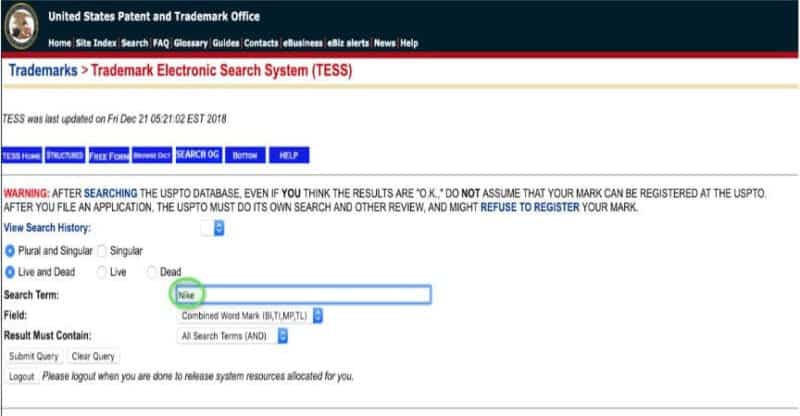
Here’s the Nike we all know, right?
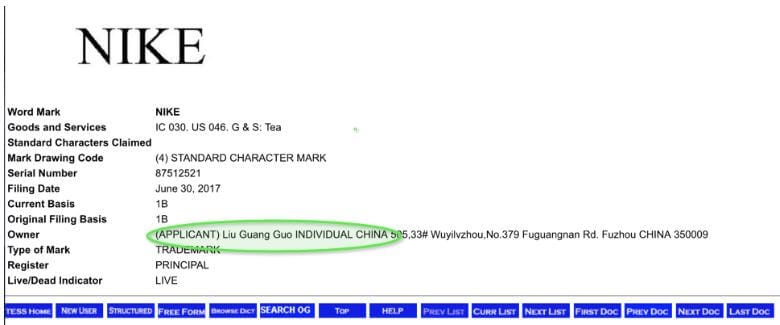
Wait… what? Who is Liu Guang Guo? Nike is owned by China? Whoa…
Take another look at the “Goods and Services” section.
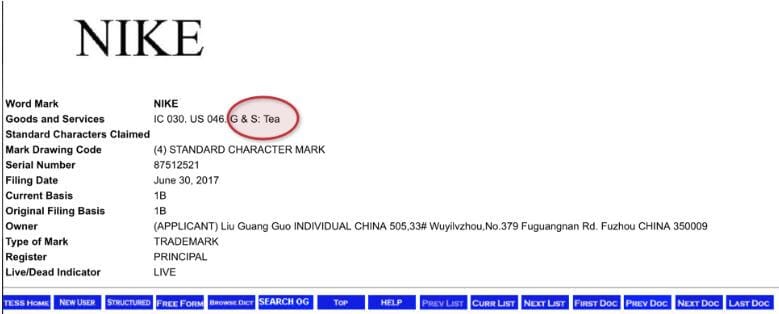
This is for “Tea”! Yes, the warm (usually) drink we sip on!
Ok… so the big takeaway is that you can have trademark rights for even famous marks like Nike for goods and services that are not a part of the other rights holder.
OK, here’s the “real” Nike we all know and love below:
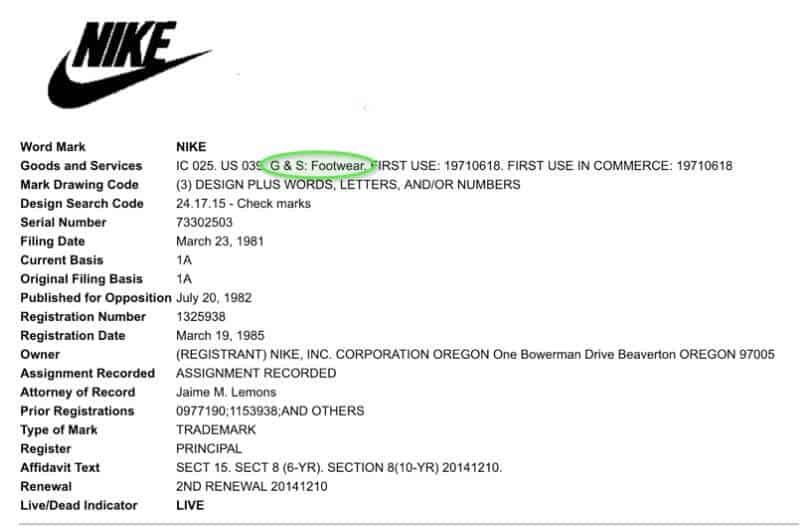
Now, this mark is for “footwear” which is under the class for “Apparel” (which we have experience in – see this video).
You can see here that it was first used in commerce in “19710618” which means: June 18, 1971!
So, even Nike took 10 years to figure out they needed to file a trademark, you’re not alone!
Now let’s dive into some examples of “design marks”.
2. Design Marks
Okay, now here’s an example of a design found on our Bold Patents site.

As you can see, this is the image used to represent Bold Patents.
So if anyone tries to take this logo and make it their own, they cannot make a direct word-for-word, design-for-design recreation of the logo.
So Where Do I Go From Here?
For more examples of trademarks – go check out here.
You can search for marks that are LIVE or DEAD and generally get a sense as to whether your brand is available.
To get a determination for sure, you will need to talk with an attorney as you need to make sure you’re looking at the correct classification.
Common Law Trademark Law
There is common law trademark protection, which arises immediately upon your using the name or logo in commerce.
This means that as soon as you make your first sale, you can prevent anyone in your geographic area from using the same name.
You’ll have to make sure you’re not infringing someone else that came before you though, which can be difficult.
For more on common law trademark rights – here’s a great resource.
Now let’s help you better understand trademarks at a state and federal level.
Then, I will share the top trademark benefits.
State Trademarks (we recommend federal)
These apply if you plan on only operating your business within a single city or state (physical goods or small business dealing locally only).
Some good examples are dry cleaners, restaurants, bars, hair stylists, handymen, and other personal care services.
If this applies to you, then its advisable to register a mark with the state only.
However, I urge most business owners to think big. Even if your current focus is to keep the business small and local, I want you to think about how your business can expand outside of the state.
By doing this early, it will be much easier to expand to other states if you decide to in the future. If you can envision a time when you decide to expand, then I urge you to push for a federal trademark.
Side note: Due to their nature, state trademarks have varying rights and protections and are different depending on which state your business resides. Nonetheless, state trademarks still serve an important function as they can establish you as the only one who can use your business name within your state. However, they are less robust than federal trademarks, which we will get to next.
For more on state trademarks, check out this site.
Are you ready to scale your brand to the national stage? Book a free consultation today!
Federal Trademarks (the smartest option)
If your business currently has or will likely have customers out of state, you will want to seek Federal Trademark Registration to be the only company in the whole country to use your mark and name. And what’s cool is that you can claim priority waaaay back to the first sale you made before you sought registration.
There are some great resources about trademarks at the USPTO.gov website. I was happy to see that the federal government realizes that there are many complications around setting up your trademark correctly. So even they recommend that you hire an attorney to help you through the process.
Federal trademark registration is the quickest, and most cost-effective to ensure your business identity, business advantage, and market position.
That said, it is important to get your business protected the right way, so don’t cut corners, don’t try to file your own trademark.
The registration of a trademark has several advantages because it protects the name of the company and the legal right of the owner of the company. The trademark registration prevents others from using your trademark symbol, sign, form, name, newspaper, etc.
Here’s a recent case where we were able to get one of our clients, Dr. Brecht, a trademark for her cosmetic surgery clinic:
The registration of the mark also grants the right to receive the resources of the trademark holder in case of trademark infringement. Another great benefit of trademark registration!
At Last! What you have all been waiting for…
Top Benefits of Trademark Registration
Again, trademarks are different from patents. That means that trademark registration is vastly different from obtaining a patent application. However, both are quite similar in the fact that they can give you some incredible advantages.
Brand Protection
Your brand is the culmination of years of blood, sweat, and tears you’ve poured into building it.
It’s a feeling, the culture, it’s the secret sauce.
Your brand is what your customers remember about you as when they tell their friends about you.
Basically, it’s how the public perceives you.
At the end of the day, the true value of a company goes beyond the books and the numbers. It goes towards what is called the goodwill of a company.
Here’s a fun video with an example about soccer I put together last year:
Now here’s an in-depth article that covers goodwill from an accounting point of view.
Now here’s another one that talks more in layman’s terms about what goodwill is and its value.
One of the main reasons to register your trademark is to inform the world that you are claiming trademark rights.
Essentially, once you have trademark protection, you automatically have the right to sue anyone who violates your rights. If a third party uses your trademark without your consent, you can easily file a lawsuit in a federal court.
Exclusive Rights to The Mark
The main benefit of trademarks is registering your brand is exclusivity.
That means you will be the ONLY ONE IN THE WHOLE COUNTRY able to sell products and/or services with that name (or even a similar name or mark).
The registration of the mark will verify its official ownership of the mark and prevent third parties from using a mark that coincides with similar or confusingly similar goods and services.
As you saw from the Nike example above, the registrations, once awarded are VERY simple (as opposed to a Patent Grant for example).
Thus, there is a satisfying simplicity to having a trademark registration certificate and wave it in the direction of any potential defaulter trying to use your name. This is usually enough to prevent offenses.
In the absence of trademark registration, it is much more difficult and far more costly to enforce common law trademark rights or to support a copyright infringement case. The burden of proof involved in the filing of such cases is substantial and the legal status of their actions to be taken and copyright infringement is always complex.
Basically, you have unlimited protection against cases of misrepresentation and infringement of intellectual property rights which makes the price of a trademark cost small in retrospect.
Are you ready to set your brand apart? Book a free consultation right now!
Bolster Business Reputation
Promoting the brand of your company at an early stage is very important for the potential development and success of your business.
A powerful and remarkable brand that is guaranteed by trademark registration is a reliable legal basis on which you can build the reputation of your business in the market.
Want to raise money? Bringing on Investors?
Given the fundamental importance of any business owned exclusively by its brands and its trademarks. Potential investors often, rightly, require the company to demonstrate such property as a condition for making the investment.
The most conclusive proof of ownership is a trademark registration certificate. And the contrary, a conflict over the ownership of the name is usually a reason why investors do not proceed. They are simply not interested in participating in a legal dispute over the ownership of one of the main assets of the business.
Registering your brand also capitalizes on the lifespan of your business, which increases the client’s confidence in your company. You get to carry forward the reputation and hard work that precedes you. You are not only as good as your bookkeeping shows.
A strong and memorable brand that is protected by trademark registration is the surest legal basis for building the reputation and goodwill of any company.
As such, a business that continues without the benefit of a registered trademark is losing a great business opportunity. Strong brands (Google, Amazon, Nike, Mercedes, Apple, The London Eye, etc.) quickly pass into the collective consciousness of the global consumer market and become synonymous with quality, consistency, and reliability.
PREVENTING TRADEMARK SQUATTERS
So far we covered the benefits of filing trademarks federally, but what about internationally?
Over time your brand will expand, and you will be poised to penetrate other markets. That is why you must consider filing for an international trademark.
Why is that so important?
One reason is trademark squatters. Countries like China base trademark rights on first to file.
First to file means that it doesn’t matter who developed the product first, rather who applied for protection first. If someone already registered your trademark in a country with first to file jurisdiction you are left with three bad options.
- Buy existing registration from the squatter (Costly)
- Rebrand (Costly)
- Enter a Trademark Dispute with the squatter (Costly)
It’s not uncommon for third parties to monitor places like Amazon with software that can track inventory to see what sells.
According to a CompuMark Study, 40% of organizations that had trademark infringements that led to litigation, spent between $50,000-$249,999 on legal proceedings. If you’re going to spend that much money defending your brand, make sure you cover your bases!
If you plan on bringing your brand to the international market, its best to speak with a trademark attorney today.
It will save you TONS of money and headaches down the road!
Protects Your Brand On Social Media
The online market is huge! According to the United States Department of Commerce, consumers spent $601.75 billion online with U.S. merchants in 2019.
Social Media is a powerful tool to promote your brand. One of the problems of social media is it allows infringers to create fake accounts and post unauthorized content that can harm your brand and its reputation, or steal customers!
Mostly all social media companies have tools in place to request a takedown of accounts or content that infringes on a company’s trademark. They make it easy and cost-effective.
The catch?
They will ask you to give them your trademark registration number.
Another benefit of trademark registration! So what are you waiting for? Book a free consultation today!
In Conclusion
Why get a trademark? The options we covered below make a strong case.
- Offer Brand Protection
- Give you Exclusive Rights to the Mark
- Bolster Business Reputation
- Preventing Trademark Squatters
- Protects Your Brand On Social Media
They can help you and your business make your mark in today’s global, corporate world.
What do you think? Do you have a better understanding of why a trademark can be used to your advantage?
Please let me know in the comments below!
Next Steps…
Are you a business owner that needs to know if it is even possible to trademark your business name or logo?
Our Bold Patents trademark attorneys will conduct a detailed consultation in which a client’s business and goods/services are disclosed, then, they will gather important information about the business to discern whether, under 15 USC Section 1051 et seq, the mark is eligible for registration.
The legal analysis and report will be limited to eligibility and will not cover distinctiveness, similar marks or likelihood of confusion, as that is a trademark search, analysis, and opinion, which requires extensive searching and detailed analysis.
Get started by booking your free consultation by clicking here!
—
Legal Note: This blog article does not constitute as legal advice. Although the article was written by a licensed USPTO patent attorney there are many factors and complexities that come into patenting an idea. We recommend you consult a lawyer if you want legal advice for your particular situation. No attorney-client or confidential relationship exists by simply reading and applying the steps stated in this blog article.
